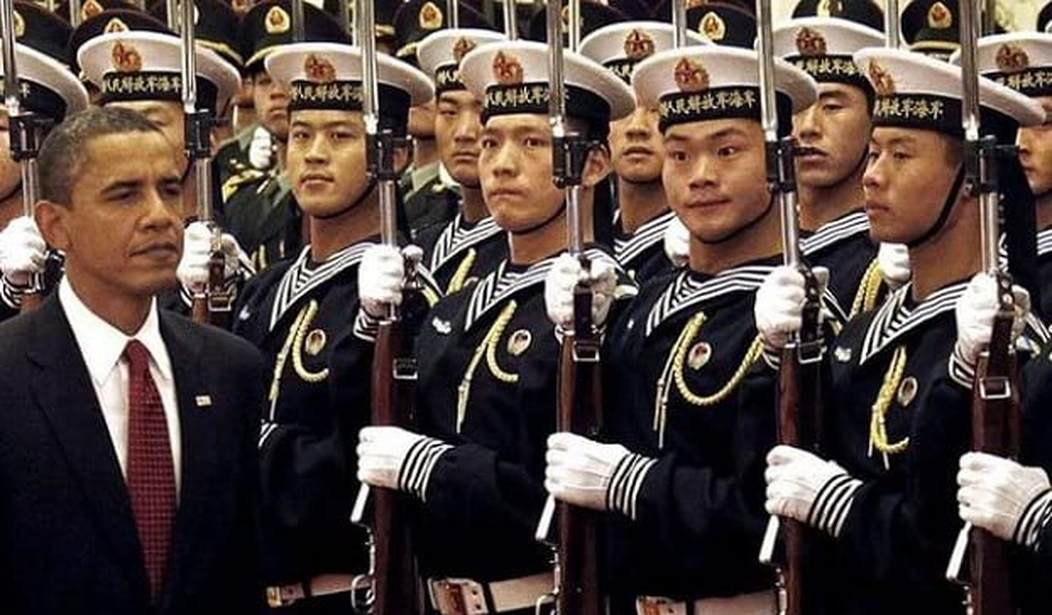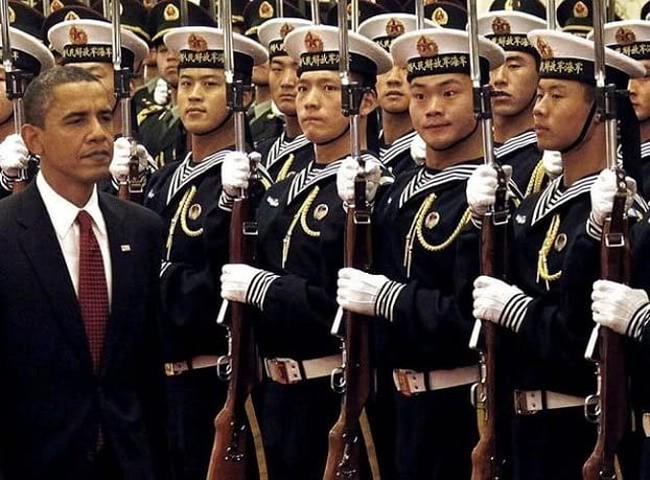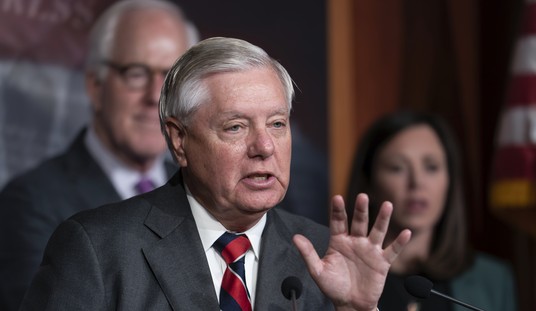One of the disadvantages of being weak is that you get pushed around. If you’re a little guy and weak it doesn’t happen all that often because there is nothing gained in the way of building a reputation in pushing a weakling around. If you are the big, fat, stupid kid, then bullies line up to mess with you. That is the position the United States finds itself in after nearly six years of malfeasance, misfeasance, and general ineptitude in the conduct of American foreign policy.
China has been intent upon claiming the South China Sea as its personal fiefdom since the US evacuated the Philippines in 1991. Part of this is an economic strategy aimed at the exploitable oil, gas, mineral deposits and fisheries believed located in the South China Sea. Part of it is a military move, to create a safe zone where foreign military ships may not operate. Part of it is a strategic move to break the already weak alliances we have with many of the nations in the Pacific Basin.
It’s clear that China’s claims and recent assertiveness have increased tensions in this key body of water. Yet while most attention has focused on Beijing’s appetite for fishery and energy resources, from a submariner’s perspective, the semi-closed sea is integral to China’s nuclear strategy. And without understanding the nuclear dimension of the South China Sea disputes, China’s maritime expansion makes little sense.
…
This strategy dates back almost two decades, to a time when China began encircling the South China Sea to fill the power vacuum created by the withdrawal of US forces from the Philippines in 1991. China reasserted ‘historical’ claims over all the islets, including the Paracel and Spratly archipelagos, and 80 percent of the 3.5 million km2 body of water along the nine-dotted U-shaped line, despite having no international legal ground to do so. Those islets can be used as air and sea bases for intelligence, surveillance, and reconnaissance activities, and as base points for claiming the deeper part of the South China Sea for PLAN ballistic missile submarines and other vessels. China also interprets the UN Convention on the Law of the Sea (UNCLOS) in an arbitrary manner and doesn’t accept military activities by foreign vessels and overflight in its waters.
Last week China upped the ante and placed a large oil rig in an area claimed by Vietnam and a nasty series of incidents has taken place as a result. On Monday, Secretary of State John Kerry weighed in:
The United States sees China’s introduction of an oil rig and several vessels in waters disputed with Vietnam as “provocative”, US Secretary of State John Kerry told China’s foreign minister in a telephone call on Monday.
China claims almost the entire South China Sea, rejecting rival claims to parts of it from Vietnam, the Philippines, Taiwan, Malaysia and Brunei.
“He (Kerry) said China’s introduction of an oil rig and numerous government vessels in waters disputed with Vietnam was provocative,” US State Department spokeswoman Jen Psaki said.
This takes place in the context of the Philippines seizing Chinese fishing vessels in areas claimed by Manila and the signing of a new defense pact between the Philippines and United States and a territorial dispute between Japan and China. China was unimpressed.
China today urged the United States to reflect on its acts on the South China Sea.
“There is indeed a country taking provocative actions in the South China Sea, but this country is not China,” Foreign Ministry spokeswoman Hua Chunying said at a daily press briefing. “The US mistaken comments have encouraged dangerous and provocative actions.”
“We expect the United States to reflect on its acts. If it indeed expects the Pacific Ocean to be pacific, it should think what role it can play in maintaining regional peace and stability,” Hua said.
Many experts in the field see the movement of the oil rig into disputed waters as a direct move against American diplomacy in the region:
The third interpretation, first publicized by The Nelson Report (May 6, 2014), argues that China’s actions were pre-planned in response to President Barack Obama’s recent visit to Japan, South Korea, Malaysia and the Philippines. During his visit, President Obama publicly opposed the settlement of territorial disputes by intimidation and coercion.
China was angered by the Obama administration’s prior criticism of China’s nine-dash line claim to the South China Sea and U.S. support for the Philippines’ decision to request international arbitration to settle its territorial dispute with China. In addition, China was outraged by President Obama’s public declaration of support of Japan and its administration of the Senkaku islands as well as President Obama’s declaration that U.S. alliance commitment to the Philippines were ironclad.
In sum, the third interpretation argues that China chose to directly confront the main premises of the Obama administration’s rebalance to Asia. China chose to expose the gap between Obama’s rhetoric and U.S. capability to respond to China’s assertion of its sovereignty claims.
Not content to merely be weak, Barack Obama is the type that insists on advertising his weakness. He followed up the signing of the defense treaty with the Philippines by claiming, rather improbably to all but gibbering idiots and the US Foreign Service, that the United States was not attempting to contain the Chinese advance into the South China Sea.
At a joint press conference in Manila, President Obama insisted the deal was not about thwarting China’s rise. “Our goal is not to counter China. Our goal is not to contain China. Our goal is to make sure international rules and norms are respected, and that includes in the area of international disputes,” he said.
His counterpart, President Benigno S. Aquino III, said the agreement was about deepening U.S.-Philippine ties and would promote “regional peace and security.”
This did not make the defense treaty seem all that useful to the Filipinos:
The deal is also under fire from Filipino politicians who see it as a hasty and counterproductive turnaround. In an email reply to questions from TIME, Senator Miriam Defensor Santiago blasted the government for signing the pact without input from the Senate and questioned the logic behind the agreement. “The U.S. should not continue to treat [the Philippines] as a satellite state, while aiming to remain on good terms with China,” she wrote. “America cannot have it both ways.”
And China used Obama’s own rhetoric to tell the world how little US support meant:
It can hardly be said that this kind of scenario is what the United States wants to see with its “pivot to Asia” strategy. Washington has explicitly said that peace and stability in Asia accords with its own interests.
Throughout his four-nation trip in Asia, Obama is trying to strike a delicate balance between its “pivot to Asia” strategy and its ever-expanding relations with Beijing.
While assuring its jittery Asian allies of U.S. commitments, Obama also shattered their illusion that Washington might support them at all costs in their territorial disputes with China. He reiterated that the U.S. government takes no sides in those disputes.
We shouldn’t delude ourselves. Neither China nor Russia are our friends. Both have interests that are much grander than our currently stunted national psyche can manage and neither are particularly averse to killing as many people as it takes to get what they want. In our dealings with both of them any semblance of weakness is and invitation for them to take advantage of. This will inevitably proceed until one or the other miscalculating when crossing one of the many “red lines’ this regime has drawn and then stepped back from and it will result in perhaps thousands of young Americans dying for no greater reason than Obama’s fecklessness. At this point, there is no more likely flashpoint in the world than the South China Sea.
At one time I would have said we are at a critical juncture in American foreign policy. But that point was passed months if not years ago. The Obama “reset” strategy, pioneered by our post-menopausal Machiavelli, Hillary Clinton, has succeeded in emboldening our enemies and scaring the living daylights out of our friends. After watching the US piss away a hard won victory in Iraq, and likewise a winnable war in Afghanistan, alienate the EU, divide NATO, and get punked by Bashar al-Assad and various and sundry mullahs, it is hard to forgive the Chinese for thinking they can do the same. Our diplomatic, economic, and military position under Obama has been so undermined that it will take decades to return to where we were on January 19, 2009.













Join the conversation as a VIP Member